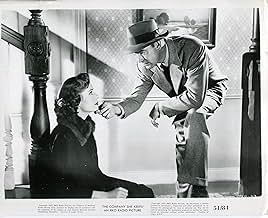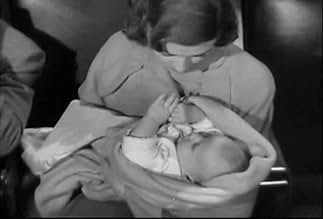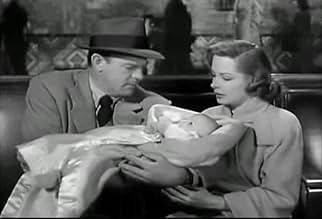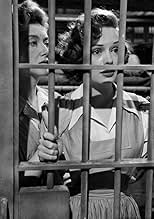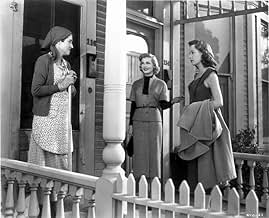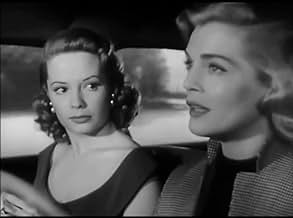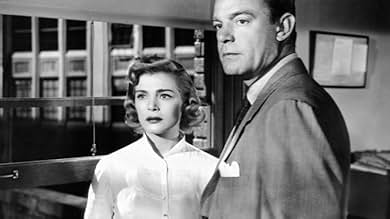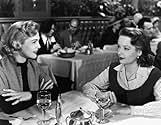NOTE IMDb
6,3/10
673
MA NOTE
Ajouter une intrigue dans votre langueA female ex-convict meets a handsome man and they start dating, but she jeopardizes their relationship by not telling him that she was in prison--and he doesn't reveal his involvement with h... Tout lireA female ex-convict meets a handsome man and they start dating, but she jeopardizes their relationship by not telling him that she was in prison--and he doesn't reveal his involvement with her parole officer.A female ex-convict meets a handsome man and they start dating, but she jeopardizes their relationship by not telling him that she was in prison--and he doesn't reveal his involvement with her parole officer.
Eric Alden
- Sergeant of Detectives
- (non crédité)
Parley Baer
- Steve
- (non crédité)
Larry Barton
- Store Detective
- (non crédité)
June Benbow
- Myrtle
- (non crédité)
Lela Bliss
- Window Shopper
- (non crédité)
Gail Bonney
- Nurse
- (non crédité)
Avis à la une
In 1950 director John Cromwell made two films about women in varying degrees of incarceration, first "Caged", and then this one. "Caged", dealing with women in prison, is gritty and realistic. "Company She Keeps," about the travails of a parolee, is neither.
As a previous IMDB reviewer stated, it starts off well, with a good scene of the prisoner in front of the parole board. Jane Greer invests her inmate with an interesting combination of hardness and vulnerability and the members of the parole board react to her with, mostly, sympathy mixed in with skepticism from the lone male board member. Then there are some hard hitting scenes with Greer and her sensitive parole officer who is well played by Liz Scott. Nice to see this veteran interpreter of hardened femme fatales in a good gal role for a change and because Scott is a fine, under rated actor she plays it without undue cloyingness.
Then Dennis O'Keefe, playing Scott's newspaper columnist boyfriend, enters the picture and all believability, intensity and interest vanish as we enter the trite realm of the Hollywood Love Triangle. Ketti Frings' dialogue switches from hard edged to purple and John Cromwell's direction goes heavy on the mush and light on the harrowing, with two glorious exceptions, the shoplifting temptation sequence and the great scene in the ladies holding cell which feels like Cromwell was just aching to return to "Caged". Which begs the question, Why didn't he? (Answer below)
Bottom line: You'd think after "Caged", which did well at the box office, that Cromwell could have done a straight on story about the difficulties of parole without mucking it up with this spurious nonsense. Wonder why he did it? Maybe the guy was more commercial than artistic. Give it a C plus.
As a previous IMDB reviewer stated, it starts off well, with a good scene of the prisoner in front of the parole board. Jane Greer invests her inmate with an interesting combination of hardness and vulnerability and the members of the parole board react to her with, mostly, sympathy mixed in with skepticism from the lone male board member. Then there are some hard hitting scenes with Greer and her sensitive parole officer who is well played by Liz Scott. Nice to see this veteran interpreter of hardened femme fatales in a good gal role for a change and because Scott is a fine, under rated actor she plays it without undue cloyingness.
Then Dennis O'Keefe, playing Scott's newspaper columnist boyfriend, enters the picture and all believability, intensity and interest vanish as we enter the trite realm of the Hollywood Love Triangle. Ketti Frings' dialogue switches from hard edged to purple and John Cromwell's direction goes heavy on the mush and light on the harrowing, with two glorious exceptions, the shoplifting temptation sequence and the great scene in the ladies holding cell which feels like Cromwell was just aching to return to "Caged". Which begs the question, Why didn't he? (Answer below)
Bottom line: You'd think after "Caged", which did well at the box office, that Cromwell could have done a straight on story about the difficulties of parole without mucking it up with this spurious nonsense. Wonder why he did it? Maybe the guy was more commercial than artistic. Give it a C plus.
This film does not fall short by any means. The Company She Keeps is a story of a young woman's plight named Diane Stuart (played by Jane Greer) that lands her behind bars on more than one occasion and when the opportunity for parole arises she has developed such a defeatist attitude that she feels she is fighting everyone in the (in)justice system. If Diane did not have bad luck she would have no luck at all. Once out of prison she visits with her parole officer Joan Willburn (played by Lizabeth Scott) and by accident or intention Diane finds the man of her dreams a newspaper columnist named Larry Collins (played by Dennis O'Keefe).
The three main characters in this film, Diane Stuart (ex-con), Joan Wilburn (parole officer), and Larry Collins (newspaper columnist) form the love triangle that has deception written all over this screen play. Lies, lies, lies, or is it just that each person is reluctant to hurt the others feelings?
As the film progresses we the audience realize that even female paroled prisoners are still considered ex-cons and their life is subjected to hell, especially in the year 1951 which is when this film was released. Truth be told, the rights and freedoms of ex- cons has not progressed much over the past 70 odd years.
Inevitably Diane finds herself in a police line-up once again for nothing at all and she realizes her life is crap and any chance of true love, life and freedom was nothing more than a pipe dream.
I won't spoil the film for anyone, but I will say that the director John Cromwell provided the audience with a surprise ending that should make most of his audience leaving the movie theater with a lot to talk about. The performances of Lizabeth Scott, Jane Greer, and Dennis O'Keefe were top notch. After close to 70 years since the films release I felt the film still contains a lot of human interest as it relates to crime and punishment.
I give the film 4**** of 5*****.
The three main characters in this film, Diane Stuart (ex-con), Joan Wilburn (parole officer), and Larry Collins (newspaper columnist) form the love triangle that has deception written all over this screen play. Lies, lies, lies, or is it just that each person is reluctant to hurt the others feelings?
As the film progresses we the audience realize that even female paroled prisoners are still considered ex-cons and their life is subjected to hell, especially in the year 1951 which is when this film was released. Truth be told, the rights and freedoms of ex- cons has not progressed much over the past 70 odd years.
Inevitably Diane finds herself in a police line-up once again for nothing at all and she realizes her life is crap and any chance of true love, life and freedom was nothing more than a pipe dream.
I won't spoil the film for anyone, but I will say that the director John Cromwell provided the audience with a surprise ending that should make most of his audience leaving the movie theater with a lot to talk about. The performances of Lizabeth Scott, Jane Greer, and Dennis O'Keefe were top notch. After close to 70 years since the films release I felt the film still contains a lot of human interest as it relates to crime and punishment.
I give the film 4**** of 5*****.
The Company She Keeps might be viewed as John Cromwell's soft-hearted "sequel" to his great Caged of the same year (some of the same cast members reappear in small parts in both). Taking over the Eleanor Parker role -- the embittered parolee with a chip-on-the-shoulder attitude -- Jane Greer finally goes "freeside." Lizabeth Scott meets her at the train, not as a mentor into the world of vice but wasted as Greer's saintly parole officer. Greer makes it plain that she's none too happy with the constraints (a night-shift job, frumpy clothes, no drinking) imposed upon her, and promptly sets her hat for Scott's fiance Dennis O'Keefe, who tumbles right into it.
And this is where Ketti Frings' script loses whatever edge it had. The hard, manipulative Greer goes soft around the edges, conflicted and vacillating. Scott, meanwhile, magnanimously cedes O'Keefe to her rival and continues to advocate on her behalf with redoubled passion (an opposite change of heart would have furnished welcome friction).
Luckily, a few goblins still hover in the shadows, and, in a brief scene set in Los Angeles' municipal lockup, Cromwell manages to reprise some of the black magic of Caged. But the syrupy social messages and Frings' earnest kind-heartedness almost sink the movie, which nonetheless preserves one of Greer's rare appearances in the noir cycle, particularly savory at the movie's start and near its end. Just don't expect another Kathie Moffat from Out of the Past.
And this is where Ketti Frings' script loses whatever edge it had. The hard, manipulative Greer goes soft around the edges, conflicted and vacillating. Scott, meanwhile, magnanimously cedes O'Keefe to her rival and continues to advocate on her behalf with redoubled passion (an opposite change of heart would have furnished welcome friction).
Luckily, a few goblins still hover in the shadows, and, in a brief scene set in Los Angeles' municipal lockup, Cromwell manages to reprise some of the black magic of Caged. But the syrupy social messages and Frings' earnest kind-heartedness almost sink the movie, which nonetheless preserves one of Greer's rare appearances in the noir cycle, particularly savory at the movie's start and near its end. Just don't expect another Kathie Moffat from Out of the Past.
When diane (jane freer) is released from prison, she has a hard time adjusting; her parole officer joan (lizabeth scott) does her best to help diane ease back into society, and a new job. And somehow goes on a date with her parole officer's boyfriend. But that huge chip on her shoulder keeps giving her away. She snaps at everyone, and blames others for her own insecurity. She's so determined to hide her parolee status that it ends up working against her. When joan's boyfriend falls for diane, it all hits the fan. How will diane, joan and larry deal with all this? Complicated. It all kind of plods along. It's all pretty unlikely, as these things go. Directed by john cromwell, who was caught up in the HUAC shenanigans in the 1940s, 1950s, rightly or wrongly. He made this film and "the racket" before he was suspended. He also specialized in fun adventures in exotic, far-away lands, which were usually the back lot. Story by ketti frings. Watchable, but not very exciting.
Scott and Greer are very good in this "woman gets out of prison" movie that could have been awful. Cromwell directs crisply and many shots are well lit and evocative. This may or may not be film-noir, depending on the viewer's perspective, but it holds up well. If you can find it on TV, it is well worth taping, since it is not easy to find on video.
Le saviez-vous
- AnecdotesAt one point, four month-old Jeff Bridges, playing the baby Jane Greer is holding in the train station, was supposed to cry. To get him to cry, Jeff's mother, Dorothy Dean Bridges, suggested they pinch him.
- ConnexionsFeatured in 2019 Golden Globe Awards (2019)
Meilleurs choix
Connectez-vous pour évaluer et suivre la liste de favoris afin de recevoir des recommandations personnalisées
- How long is The Company She Keeps?Alimenté par Alexa
Détails
- Date de sortie
- Pays d’origine
- Langue
- Aussi connu sous le nom de
- The Company She Keeps
- Lieux de tournage
- 114-116 North Hope Street, Los Angeles, Californie, États-Unis(Diane Stuart's apartment building)
- Société de production
- Voir plus de crédits d'entreprise sur IMDbPro
- Durée
- 1h 22min(82 min)
- Couleur
- Rapport de forme
- 1.37 : 1
Contribuer à cette page
Suggérer une modification ou ajouter du contenu manquant

